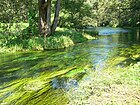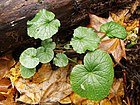Note: This is a project under development. The articles on this wiki are just being initiated and broadly incomplete. You can Help creating new pages.
Difference between revisions of "Eutrema japonicum - Wasabi"
(→Chemical Composition) |
(→References) |
||
| Line 82: | Line 82: | ||
<references> | <references> | ||
| − | <ref name="chemical composition">[https:// | + | <ref name="chemical composition">[https://en.wikipedia.org/wiki/Wasabi "chemistry"]</ref> |
<ref name="Leaf">[https://web.archive.org/web/20131226161459/http://www.wildflowers-guide.com/39-agrimony.html "wayback machine"]</ref> | <ref name="Leaf">[https://web.archive.org/web/20131226161459/http://www.wildflowers-guide.com/39-agrimony.html "wayback machine"]</ref> | ||
| − | <ref name="How to plant/cultivate">[https:// | + | <ref name="How to plant/cultivate">[https://www.herbwisdom.com/herb-wasabi.html "cultivation details"]</ref> |
</references> | </references> | ||
Revision as of 09:18, 9 May 2018
Wasabi is a plant of the Brassicaceae family, which includes cabbages, horseradish, and mustard. The plant grows naturally along stream beds in mountain river valleys in Japan.
Contents
- 1 Uses
- 2 Parts Used
- 3 Chemical Composition
- 4 Common names
- 5 Properties
- 6 Habit
- 7 Identification
- 8 List of Ayurvedic medicine in which the herb is used
- 9 Where to get the saplings
- 10 Mode of Propagation
- 11 How to plant/cultivate
- 12 Commonly seen growing in areas
- 13 Photo Gallery
- 14 References
- 15 External Links
Uses
Heart problems, Cancer, Osteoporosis, sinuses, Arthritis, Respiratory problems, Gut Health, Sore throats
Parts Used
Chemical Composition
MITC, methylthioheptyl isothiocyanate, methylthiooctyl, isothiocyanate[1]
Common names
| Language | Common name |
|---|---|
| Kannada | |
| Hindi | |
| Malayalam | |
| Tamil | |
| Telugu | |
| Marathi | NA |
| Gujarathi | NA |
| Punjabi | NA |
| Kashmiri | NA |
| Sanskrit | |
| English | Agrimony |
Properties
Reference: Dravya - Substance, Rasa - Taste, Guna - Qualities, Veerya - Potency, Vipaka - Post-digesion effect, Karma - Pharmacological activity, Prabhava - Therepeutics.
Dravya
Rasa
Guna
Veerya
Vipaka
Karma
Prabhava
Habit
Identification
Leaf
| Kind | Shape | Feature |
|---|---|---|
| Simple | The leaves are divided into 3-6 toothed leaflets, with smaller leaflets in between |
Flower
| Type | Size | Color and composition | Stamen | More information |
|---|---|---|---|---|
| Unisexual | 2-4cm long | Yellow | 5-20 | Flowers Season is June - August |
Fruit
| Type | Size | Mass | Appearance | Seeds | More information |
|---|---|---|---|---|---|
| 7–10 mm (0.28–0.4 in.) long pome | clearly grooved lengthwise, Lowest hooked hairs aligned towards crown | With hooked hairs | {{{6}}} |
Other features
List of Ayurvedic medicine in which the herb is used
- Vishatinduka Taila as root juice extract
Where to get the saplings
Mode of Propagation
How to plant/cultivate
Prefers a position in wet soil or shallow water[3]
Commonly seen growing in areas
Tall grasslands, meadows, Borders of forests and fields.
Photo Gallery
References
External Links
- Pages that are stubs
- Ayurvedic Herbs known to be helpful to treat Heart problems
- Ayurvedic Herbs known to be helpful to treat Cancer
- Ayurvedic Herbs known to be helpful to treat Osteoporosis
- Ayurvedic Herbs known to be helpful to treat sinuses
- Ayurvedic Herbs known to be helpful to treat Arthritis
- Ayurvedic Herbs known to be helpful to treat Respiratory problems
- Ayurvedic Herbs known to be helpful to treat Gut Health
- Ayurvedic Herbs known to be helpful to treat Sore throats
- Herbs with Dried Folaige used in medicine
- Herbs with Whole herb used in medicine
- Herbs with common name in English
- Habit - Herb
- Index of Plants which can be propagated by Seeds
- Index of Plants which can be propagated by Cuttings
- Herbs that are commonly seen in the region of Tall grasslands
- Herbs that are commonly seen in the region of meadows
- Herbs that are commonly seen in the region of Borders of forests and fields
- Herbs





